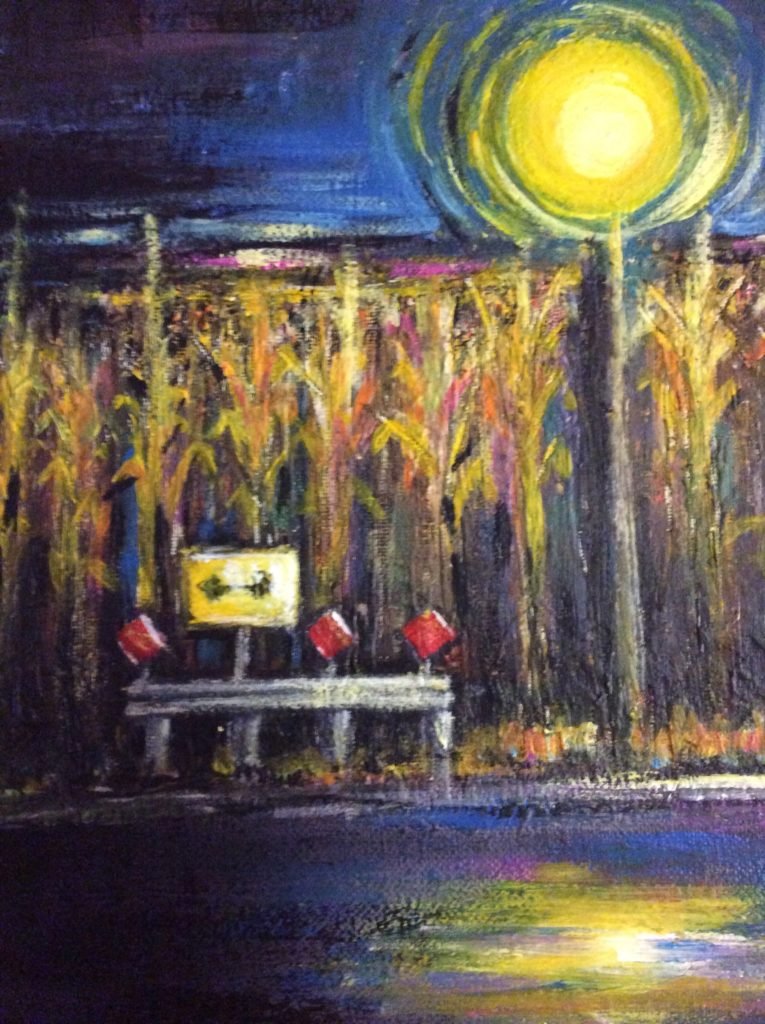
The familiar constriction arose in her chest. She followed the dark echoes of her husband’s steps; his gait sober as cold coffee. Heel, toe. March. She giggled at the image of her husband as a soldier. His shoulders were still square, but his chest was sunken, and his paunch tightened his shirt.
The pain moved into her shoulders as she held her breath against hiccups.
“I can drive,” she said, exhaling.
“You can hardly walk,” he said. “Try to keep up.”
“Try it in heels!” That image caused her to smile. “What’s your hurry? You’re the one panting like you’re running uphill.”
Husband and wife for twelve-and-a-half years, they moved along the sidewalk; he straight and direct, she like a trailer buffeted by crosswind. They passed dark cars parked along the boulevard. The party was still on behind them. She looked back at the light spilling from the windows.
“C’mon, your night is done,” he said.
“You always drag me out early.”
“You don’t want to overstay your welcome. Trust me.”
“Loosen up for once. You think it’s all a picnic for me? ‘What’s happening with your husband, how’s the job search? How’s he holding up?’ Nobody understands the pressure I’m under.”
“Everyone knows it’s not exactly the greatest economy right now. They’re all afraid of getting axed themselves. I’m a reminder of what could very easily happen to any of them.”
“Yeah, the economy. They all seemed petrified,” she said. “Give me the keys, I want to drive my new car.”
“You’re in no condition.”
“When you can afford your own car, then you can drive. I’ll drive my car,” she said. He’d recently sold his car to help make ends meet until he found work. Then, last week, she’d impulsively traded in her five-year-old Pontiac after dropping him at a job fair.
They approached the rear of the sedan. He stamped out a cigarette.
“Ugly car,” he spat. “Couldn’t wait until I found work? At least you could have taken me with you to the dealer.” He lit another Winston.
Stepping unsteadily off the curb, her knee bumped the rear of the car and her purse hit the trunk and flipped. Lipstick, chocolate, mascara, hairbrush, Band-Aid, driver’s license and mirror all spilled down the trunk lid and cascaded to her feet. She cleared her throat and stood between her car and the one behind, blocking his path to the driver’s side. He blew smoke into the night and moved to the front of the car. With effort, she again blocked his path. Hand outstretched, she demanded, “The keys!”
He turned his back to her and scanned the neighborhood at midnight. The homes were dark and yard lights shone meekly. The air was heavy for an early Midwest autumn. Once, he’d tried to move them here, just a few houses from where they stood, but they hadn’t been able to scratch together a down payment. They’d both recently passed forty.
Since being laid off, away from the daily grind, he’d found a different perspective. He began to see why they’d saved so little. His salary had always disappointed and her teaching salary was good for cost-of-living adjustments at best. It wasn’t a monastic lifestyle, but he did deny himself luxuries. And her drinking had been getting worse since her mother passed away last year; her efforts to disguise it were moving from comically inept to destructive. He no longer considered it mere bad luck when costly failures occurred. He’d grown to feel the presence of a deviant with ruinous intent, creating mishaps. Stray shopping carts smashed headlamps and taillights both. She caught a sweater in the garbage disposal, causing the motor to burn up. A basement sink overflowed onto good carpet. Lightning struck; not once, not twice, but three times; tree, garage and lawn tractor. She’d abandoned the tractor in the backyard after running out of gas one afternoon; he’d returned after dark and hadn’t noticed it. By then she’d forgotten the afternoon completely. Next morning, they woke to see their red Toro charred to black.
The street had no traffic. It was a four-and-a-half-mile drive to their small house at the doormat of the suburban town. The roads would be empty at this hour. He’d been fifteen years in insurance and knew the game intuitively. He’d come to believe that chance was a living, breathing thing that evens out on the scorecard of human activity, and God knew a break was due him. Perhaps a point could be made by allowing events to unfold. He was prepared to risk harm in exchange for the opportunity to present to her the consequences of her drinking. Guilt and humiliation were powerful—he knew from her wielding them against him—and could prompt her to see, could prompt her to change. It was necessary for a husband to take occasional risks in a relationship. He set his chin.

He wheeled around and, harder than he’d intended, shoveled the noisy set of keys—complete with a worn copper heart, a rabbit’s foot and a penlight—at the middle of her to ensure they would not clatter into the street. The jangly missile hit her hip, glanced off her knee before hitting the asphalt. “Go ahead,” he said, “get us home.”
The act stung her. Heat radiated from her gut to her neck and finally her face. She bent to retrieve the keys and had to steady herself. The wooziness triggered a childhood memory of her mother’s demureness “lessons” she’d had to endure. She still felt the burning of her mother’s stare and heard her Eastern accent clearly, “What are you doing with this soft, round man in this flat, flat place?” She shook her head to clear it. At that moment all she wanted in the world was to be home where there was space to avoid her husband and her memory.
She fumbled to unlock the door while he retrieved the contents of her purse. “If it gets bad, I’m taking over. Please, don’t hit anything,” he said.
Seated, he made a show of double-checking his and then her seat belt, then placed one palm on the dash and grabbed the handle above the window. His smoky skin and clothes overpowered the new car scent and added to her queasiness. Adjusting the rear-view mirror, she was glad they’d never had a child. A strange thought that came seeming from nowhere. They’d tried, but she was under a lot of pressure then and truthfully wasn’t taking good care of herself. She’d since stopped smoking and now walked every day. In the mirror, the back seat seemed to undulate, but at least it was empty.
She inched the car back and forth along the curb, not daring to get too close to either the car in front or behind. She shifted at least twice more than she might have if he was not there, ready with criticism. The car finally cleared and continued ahead, rolling along the boulevard, past the dark houses and through the tunnel of hanging elms. After a few blocks, when the streetlamps ended, she realized the headlights were not on. In reaching for them her wrist tapped the wiper control. The blades erupted into motion, and washer spray spattered the windshield. She shut them off with as much composure as she could summon, keeping her eyes ahead.
“Deliver me, Lord,” he said.
The car juddered at the first stop sign. She preemptively said, “Brakes aren’t warm yet. Normal.”
“It’s normal only to use one side of the road, too,” he said, under his breath.
They continued without incident, yet uneasiness was between them. About halfway home, she spoke.
“You enjoy tearing me down,” she said.
“I don’t. I’m trying to point out what your drinking is doing to me, to us.”
“It’s always about you, after all, isn’t it?”
The car approached an intersection outside of town, a four-way stop with new sodium-vapor streetlamps. Cones of yellow light struggled to reach the pavement. An abandoned farm sat dark on the east and a cornfield filled the west.
The car didn’t slow.
In a panic, he found her staring at him, waiting for a response, as if she was in front of her classroom and had called upon him for an answer.
“Stop sign!” he yelled, pointing.
She slammed the brake. Her face creased. The car skidded over a loose patch and came to rest near the middle of the intersection. Opening her eyes, she was relieved to find no other cars. During the skid, she thought the headlights had lit upon a scarecrow in the cornfield.
“That’s it. I’ll take it from here,” he said.
“You win,” she said. Her heart thumped and her shoulders seized. Waves pounded the back of her head. She kicked the door open and took three polite steps before vomiting. Hunching over, she noticed a ruinous run in her hose, her last good pair. The rear hem of her skirt—the one she’d fastened with her classroom stapler—had fallen at some point during the night. Ragged threads hung.
Beside the car, he regarded their situation. The dust cloud had slowly cleared, and it was a calm, even peaceful evening. There was quiet under the stars. He wished she could appreciate its beauty. Thankfully, they were each in one piece. He walked to her. He extended his hand and began to tenderly rub her back. Who would choose this pain? She took the offer of his handkerchief and wiped her eyes and mouth. She blew her nose. This was the outcome he had hoped for; no injuries and an admission of defeat. He hoped she might connect the pain to her actions, feel his support and decide to change.
His hand was snakelike cold on her back. She recognized the slacks she’d bought for him to wear to the job fair rather than a skirt for herself. That was it—he was selfish. Vomiting always cleared her head for a time. Some of her best, most trustworthy insights came after. His selfishness was of no doubt to her.
She suddenly took quick hops toward the cornfield and looped the keys in a high arc toward the spot she’d imagined the scarecrow to have been, though she could now see there was none. The heel of her left shoe—her last decent pair—snapped off and she hit the pavement on hands and knees. Soon after, they both heard the metal splash far into the corn. “Dammit,” he said. He attempted to make some sense of the situation. He moved quickly past her inexplicable act to an understanding of how their problems could compound. All it would take is a policeman to cruise upon the scene, or any intolerant busybody with a cell phone. He visualized his signature next to hers on all that they owned. Liability looked him hard in the face. His name in the Police Blotter of the local Herald. Fodder. Unemployed fodder. It was too much. He left her and stomped toward the cornfield.
She pushed herself to her feet with broken shoes in hand and painfully stepped over small jagged stones to the new car glowing under the golden light, its doors open invitingly, resting in the middle of the intersecting roads. She nestled into the passenger seat.
He would retrieve the keys and get them home and things would be the same tomorrow, a Sunday. She knew this. In the morning, dry toast, coffee, a couple of aspirins and not long thereafter, juice with a splash of something. The new car scent was pleasant, untainted by her husband’s cigarettes. She took in the complex pattern of dash lights, until her eyes lit on the glove box and she remembered the emergency vodka.
Under the registration, invoices and insurance proofs (disarray always found the glove box) was an unopened pint just where she had stored it. She clutched it firmly yet with care. In moving the papers around to try to re-latch the glove box, she came across the spare key. It surprised her. She was certain she’d placed it in the junk drawer, with every other necessary keepsake.

There wasn’t a debate in her mind between foresight and fortune, only relief at finding the bottle. It had been almost an hour since her last drink. The key was an unexpected bonus; an insurance policy. Maybe someone was watching over her. She stood on the running board, elbows on the roof. She took a drink. She silenced herself, attending to the sound of her husband’s heavy breathing, but she heard something else, another presence in the field, moving quickly–too quickly to locate in the darkness. She thought to warn her husband; surprised then to feel tenderness toward him, doing what he must to get them home. But doubt entered her mind; could it be another trick? Like the visit of her mother’s voice earlier? Her mother had been gone for, well, she had forgotten exactly how long. The evening had been taxing enough to forgive herself for forgetting. Concentrating, she squinted. Her mind conjured what her eyes could not see; a hunched form now well into the field, searching methodically up and down the rows, shoulders set against what she could see, the brittle, drying stalks.


Share this post with your friends.



Great writing Brad! Enjoyed reading!
How kind, glad you enjoyed it.